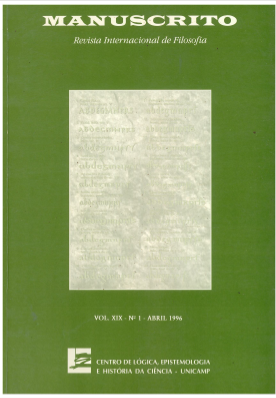Resumen
o
Citas
Chwistek, L. (1948). The Limits of Science. (London, Kegan Paul).
Goddard, R. & Routley, R. (1973). The Logic of Significance and Context. (Edinburgh, Scottish Academic Press).
Lear, J. (1982). Leaving the world alone, Journal of Philosophy, vol. xxx, pp. 382-403.
Mortensen, C. (1989). Anything is possible, Erkenntnis, vol. 30, pp. 319-337.
Penrose, R. (1991). The Emperor's New Mind. (Cambridge, Cambridge University Press).
Priest, G. (1987). In contradiction. (Dordrecht, Martinus Nij-hoff).
Priest, G. et al. (eds.) (1989). Paraconsistent Logic. (Munich, Philosophia Verlag).
Priest, G. (1991). The limits of thought - and beyond, Mind, vol. 100, pp. 361-370.
Prior, A. (1960). On a family of paradoxes, Notre Dame Journal of Formal Logic, vol. 2, pp. 16-32.
Regan, T. (1982). All that Dwell Therein. (Berkeley/Los Angeles, University of California Press).
Rosen, S. (1980). Limits of Analysis. (New York, Basic Books).
Routley, R. & Routley, V. (1975). The role of inconsistent and incomplete theories in the logic of belief, Comunication and Cognition, vol. 8, pp. 185-235.
Routley, R. (1980). Exploring Meinong's Jungle and Beyond: An Investigation of Noneism and the Theory of Items. Canberra: Department of Philosophy Monograph, Series 3, Research School of Social Sciences, Australian National University.
Routley, R. (1981). Necessary limits to knowledge: unknowable truths', in Essays in Scientific Philosophy, ed. E. Morscher et al (Munich, Comes-Verlag).
Russell, B. (1961). Human Knowledge: Its Scope and Limits.(London, Allen & Unwin).
Russell, B. (1967). The Problems of Philosophy. (Oxford, OxfordUniversity Press).
Strawson, P.F. (1985). Skepticism and Naturalism: Some Varie-ties. (New York, Columbia University Press).
Sylvan, R. (1985). Introducing polylogue theory, Philosophica,vol. 33, pp. 53-69.
Sylvan, R. (1986). Towards an improved cosmo-logical synthesis, Grazer Philosophische Studien, vol. 25/6, pp. 135-178.
Sylvan, R. (1990). Wide-ranging applications of relevant logic, research document, Canberra.
Sylvan, R. (1992). Grim tales retold, Logique et Analyse, vol. 139-140, pp. 349-374.
Sylvan, R. (1995). Freedom without determinism, Acta Analytica, vol. 13.
Sylvan, R. (1996). Transcendental Metaphysics. (Cambridge, White Horse Press).
Van Fraassen, B. (1996). The world we speak of, and the language we live in, Philosophy and Culture, Proceedings ofthe XVIIth World Congress of Philosophy, Montreal, pp. 213-221.
Wilber, K. (1983). Eye to Eye. (New York, Anchor Books).
Williams, B. (1985). Ethics and the Limits of Philosophy. (London, Fontana).
Wittgenstein, L. (1953). Philosophical Investigations. (Oxford, Blackwell).
Wittgenstein, L. (1964). Remarks on the Foundations of Mathematics. (New York, Macmillan).

Esta obra está bajo una licencia internacional Creative Commons Atribución 4.0.
Derechos de autor 1996 Manuscrito: Revista Internacional de Filosofia

